1900
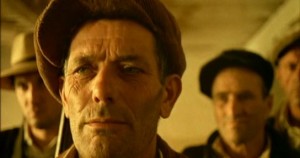 Here’s the idea behind “A Canadian, an American, a Lawyer, and an Elitist”: Rhett’s favorite movie is Meatballs 4, Shawn has an unhealthy fixation on Resident Evil, Richard scoffs at anything that isn’t pretentious and hoity toity, and Adam is a prick who hates everything. We all watch far too many movies, and spend our time analyzing them. So we each watch the same movie, write our analysis of them, and then go to a chat room to discuss it, unaware of what the others have written.
Here’s the idea behind “A Canadian, an American, a Lawyer, and an Elitist”: Rhett’s favorite movie is Meatballs 4, Shawn has an unhealthy fixation on Resident Evil, Richard scoffs at anything that isn’t pretentious and hoity toity, and Adam is a prick who hates everything. We all watch far too many movies, and spend our time analyzing them. So we each watch the same movie, write our analysis of them, and then go to a chat room to discuss it, unaware of what the others have written.
A warning: if you haven’t seen the film we are discussing, it may not be best to read this article, because it is spoiler heavy.
Keep in mind that when we watched and analyzed the film in early 2005, it was extremely hard to find. There was no 2 disc edition from Paramount or any other version that would be easy for an American to find.
Analysis by a Canadian: Rhett Miller
Bernardo Bertolucci’s 1900 was his follow up to his critical and commercial apex, Last Tango in Paris, in which he was given the time, budget and talent to really make anything he wanted. What he ended up making was a five hour film blanketing forty five years (from 1900 to the end of World War II) in the lives of two friends from opposite sides of the tracks. It is sprawling but for the most part personal, always tracking the two leads (De Niro and Depardieu) from childhood onward. In that respect it resembles a Sergio Leone film. Leone, with his dollars trilogy and the masterpiece, Once Upon a Time in the West, was known for drawing out his elemental good guy/bad guy character studies into sprawling testaments of style and length. Bertolucci himself would serve as a screenwriter on Once Upon a Time in the West, in effect both borrowing epic ideas from Leone as well as giving Leone equal ambitions. It is doubtfully a coincidence that following 1900, Leone would go on to make his lengthiest film, Once Upon a Time in America, covering a similar time in America, again from the aging perspective of 1900‘s lead, Robert De Niro. Considering Leone’s and Bertolucci’s work, both together and apart, the themes between their work is surprisingly similar.
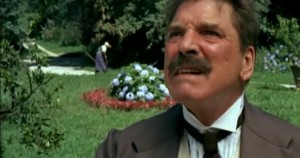 Above all else, 1900 and Once Upon a Time in the West are about change. In West, Bertolucci writes of the coming of the railroad, signifying the end of the frontier and the beginning of modernity. In 1900 he establishes a similar theme of modernity in showing how farming changed from the dedicated work of many to the calculated mechanics of machinery. The peasants were first replaced with horses, and the horses would go on to be replaced by machines. To steal a quote from the film, landowners effectively “turned draught horses into steam horses”. While West uses modernity only as a backdrop to the personal life of Harmonica, 1900 is all about the push towards modernity, and how it changes class relations.
Above all else, 1900 and Once Upon a Time in the West are about change. In West, Bertolucci writes of the coming of the railroad, signifying the end of the frontier and the beginning of modernity. In 1900 he establishes a similar theme of modernity in showing how farming changed from the dedicated work of many to the calculated mechanics of machinery. The peasants were first replaced with horses, and the horses would go on to be replaced by machines. To steal a quote from the film, landowners effectively “turned draught horses into steam horses”. While West uses modernity only as a backdrop to the personal life of Harmonica, 1900 is all about the push towards modernity, and how it changes class relations.
At the heart of the film are Alfredo (De Niro), a child born into land ownership, and Olmo (Depardieu), a child born into poverty. They grow up very much alike, playing together in waters and exploring their sexuality, but the advancement of modernity eventually drives them and their classes apart. With the introduction of machinery and industrialization to the workplace came the separation between land owner and worker, master and peasant, bourgeoisie and proletariat. What originally started as a collective became a fascistically controlled enterprise. Instead of working together for the common good, machines made people expendable cogs, slaves to doing what the machines required. Thought was no longer required, nor community, it became all about control. Both Alfredo and Olmo come to respectively symbolize the differences between the bourgeoisie and proletariat.
The Alfredo-Olmo split would also come to represent more than just class, but government itself. Olmo, with his strong belief in community and the struggle of the proletariat, would come to embrace communism, while Alfredo would try to protect his father’s wealth by employing (albeit lessened) fascistic tendencies. Alfredo would employ Attila (Donald Sutherland) to find and imprison those who veered away from his company line, while Olmo would fight for equality in allowing those who cultivated the land to also own it. One looks out for himself through force, the other his community through action. So Bertolucci essentially creates complex metaphors of his leads, covering both class and governmental differences with one broad stroke. The proletariat versus the bourgeoisie and communism versus fascism. This is no easy undertaking, but at five hours, you can attempt such complexities.
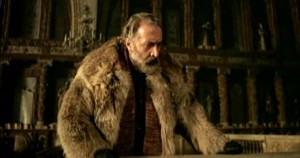 The metaphors don’t end there though, and in lacing the film with copious animal analogies, Bertolucci may have bitten off more than he could chew. Pigs come to represent fascism in that Olmo kills and guts one to show his dislike for authoritative control, and how the ultimate fascist, Attila, dies “like a pig” in a stable. Communists, on the other hand, are portrayed as cats, in that they win society over with their cute ambitions, but ultimately end up defenseless. Like Olmo gutting a pig, Attila crushes the skull of a cat to make his political allegiances clear. So fascists are pigs, communists cats, simple enough. But Bertolucci compares the dying aristocracy with cows (dangling utters symbolizing male impotency), fascists to hounds, horses to machines, ducks to innocence and moles to god knows what. The subtext of all the animal analogies gets so immense that it ultimately starts to drown out the meaning. Bertolucci just fits too many cards into his deck, to the point where they no longer match and simply become confused. By contrast, Terence Malick would make his metaphors of land and animal in Days of Heaven much more focused, and hence much more effective two years later. Rather than using the five hour runtime to really get to the essence of class relations or politics, Bertolucci instead gets less focused as each reel runs forth. What we get are a number of brilliant scenes that fail to fully synthesize in the end.
The metaphors don’t end there though, and in lacing the film with copious animal analogies, Bertolucci may have bitten off more than he could chew. Pigs come to represent fascism in that Olmo kills and guts one to show his dislike for authoritative control, and how the ultimate fascist, Attila, dies “like a pig” in a stable. Communists, on the other hand, are portrayed as cats, in that they win society over with their cute ambitions, but ultimately end up defenseless. Like Olmo gutting a pig, Attila crushes the skull of a cat to make his political allegiances clear. So fascists are pigs, communists cats, simple enough. But Bertolucci compares the dying aristocracy with cows (dangling utters symbolizing male impotency), fascists to hounds, horses to machines, ducks to innocence and moles to god knows what. The subtext of all the animal analogies gets so immense that it ultimately starts to drown out the meaning. Bertolucci just fits too many cards into his deck, to the point where they no longer match and simply become confused. By contrast, Terence Malick would make his metaphors of land and animal in Days of Heaven much more focused, and hence much more effective two years later. Rather than using the five hour runtime to really get to the essence of class relations or politics, Bertolucci instead gets less focused as each reel runs forth. What we get are a number of brilliant scenes that fail to fully synthesize in the end.
Bertolucci makes some powerful observations on the nature of fascism and communism, but it is often at the expense of his characters. Again, the metaphors become so elaborate that the subtext overpowers the text. Olmo and Alfredo, despite their screen time, never really develop much as characters. They are painted in such political broad strokes that by the end of the picture, when Alfredo is put on trial, the audience hasn’t a clue as to whether he deserves to die or not. We rarely see him running his farm, nor do we see what kind of personality he has. We see how he is both similar and different to Olmo, and we see time and again his wealth and his aristocracy, but we never really see him for who he is. So when the end comes, Bertolucci is left filling in the gaps, having Alfredo plead to his prosecutors and to the audience for his goodness. At five hours, Betolucci should be able to establish character, but in 1900 all he manages is theme. It is ironic that Bertolucci was able to elicit a masterful Method performance from Brando in Last Tango, but completely overwhelms De Niro with everything but Method character in 1900. Bertolucci’s scope was so big, his ambitions too large, that he failed to acknowledge the basics of character.
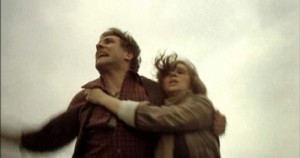 Although Bertolucci certainly attempted more than he could handle in 1900, the film still has much to recommend. Even at five hours long and with loosely developed characters, the movie always remains interesting. The camera is always moving, and the way Bertolucci stages some scenes, particularly an ongoing triangle between Alfredo, his wife Ada and his uncle Ottavio, where the camera continually rotates to place Ada as the pivot in the middle recalls some of Leone’s finest work. The sun drenched photography and highly nostalgic thematic structure further recalls Leone, but Bertolucci manages to make it his own. Before Alfredo and Olmo get bogged down in metaphors, Bertolucci manages to capture the innocence of childhood with a nostalgia rivaling similar scenes in Once Upon a Time in America. Whether they are learning work ethic by hunting frogs, sexuality by exploring their privates, or bravery by lying on train tracks, the two child leads effectively evoke the naivety and purity of youth. The scene of the boys lying on the tracks, which ultimately becomes more important after a revelation in the finale, has a tenderness equal to the cupcake scene in America. Children doing childish things that end up meaning more than they could ever have envisioned.
Although Bertolucci certainly attempted more than he could handle in 1900, the film still has much to recommend. Even at five hours long and with loosely developed characters, the movie always remains interesting. The camera is always moving, and the way Bertolucci stages some scenes, particularly an ongoing triangle between Alfredo, his wife Ada and his uncle Ottavio, where the camera continually rotates to place Ada as the pivot in the middle recalls some of Leone’s finest work. The sun drenched photography and highly nostalgic thematic structure further recalls Leone, but Bertolucci manages to make it his own. Before Alfredo and Olmo get bogged down in metaphors, Bertolucci manages to capture the innocence of childhood with a nostalgia rivaling similar scenes in Once Upon a Time in America. Whether they are learning work ethic by hunting frogs, sexuality by exploring their privates, or bravery by lying on train tracks, the two child leads effectively evoke the naivety and purity of youth. The scene of the boys lying on the tracks, which ultimately becomes more important after a revelation in the finale, has a tenderness equal to the cupcake scene in America. Children doing childish things that end up meaning more than they could ever have envisioned.
The finale of the film is Bertolucci at his most ambitious, and perhaps the most effective moment of the entire film. Bertolucci spends five hours detailing the differences between the fascist and communist movements, but in the end surprisingly states how they are ultimately the same. Alfredo observes, after his trial and after Italy has seemingly had its communist revolution, that deep within each communist, particularly the boy who held him at gunpoint, lies fascist impulses of domination. The proletariat struggle, and those brought out by modernity end up having little impact at all. No matter how much society may change, be it technology or government, the essence of human nature remains the same. Bertolucci ends his film with Alfredo and Olmo continuing a fascist/communist argument from their middle ages all the way through to their elderly state. Despite all they’ve been through, they are still only humans seeking out the values they were born with. Olmo listens to power lines for his deceased father and Alfredo lies on the train tracks, as both did as they were children. No matter how much things change, they ultimately remain the same.
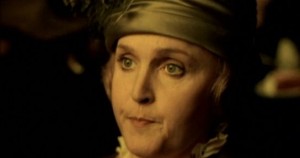 1900‘s ending, both pessimistic and nostalgically uplifting, is the film’s crowning achievement. The ending may make the endless hours spent documenting political struggle seem irrelevant, and it may not answer many of the questions and themes Berolucci laces throughout his film, but that may just be the point. Struggle, whether it be documented over five hours (1900) or five years (WWII), ultimately ends with little progress. The oppressed continue to foster ill feelings, and people remain unchanged in their values. Bertolucci takes a long while making his point, and misses many other points along the way, but the ending image remains one of subtle beauty. 1900 is, despite all its faults, a film that lives up to its epic stature.
1900‘s ending, both pessimistic and nostalgically uplifting, is the film’s crowning achievement. The ending may make the endless hours spent documenting political struggle seem irrelevant, and it may not answer many of the questions and themes Berolucci laces throughout his film, but that may just be the point. Struggle, whether it be documented over five hours (1900) or five years (WWII), ultimately ends with little progress. The oppressed continue to foster ill feelings, and people remain unchanged in their values. Bertolucci takes a long while making his point, and misses many other points along the way, but the ending image remains one of subtle beauty. 1900 is, despite all its faults, a film that lives up to its epic stature.
Analysis by an American: Shawn McLoughlin
1900 is the most appropriate title anyone could have come up with for this film. First, the events of the film begin in the year 1900 or thereabouts, and the entire movie makes up the better part of the 20th century. Most obvious though, you will feel you spent one-hundred years in your seat. There are plenty of longer movies in this world, however, most of them (unless directed by Andy Warhol) attempt to keep you engaged for the duration. Sadly, 1900 makes no attempt to keep you seated, but expects you to numb your posterior just the same.
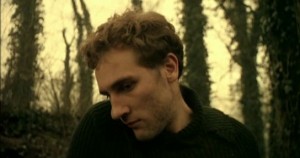 That is not to say it is a bad film, or even a particularly boring one. At its core it is a great look at friendship through all extremes and also a significant pontification on politics in Italy, and how they relate to the class system in effect at the time. The first half of the film suffers the most. There is too little happening here, but the friendship between Alfredo, the land-owner’s grandson, and Olmo, the bastard grandson of a laborer is entirely believable. Alfredo’s grandfather immediately makes a point of saying to Olmo’s, “When we are first born there is no difference.” This is important as we will witness many times over, that even as they mature into young adults they always admire what the other possesses that they themselves do not. Alfredo is, naturally, much richer and is destined for power, and Olmo has more strength of will and is the brave poet. This is illustrated to a greater degree with the scenes where Olmo has no fear laying down on the railroad tracks and Alfredo hesitates. Meanwhile, Alfredo has no problem flexing his power over Olmo in the silkworm room. Scenes such as these show how the characters grow and develop. Scenes such as where the boys show each other their erections, while not as disturbing as it may sound on paper, are a distraction and not needed, much like 1/3rd of the film. As the children age, go off to war and return, I become somewhat more engaged. In a film over five hours long, I hesitate to say things like “I would like this to have been extended” but that is particularly the case in this segment where characters aren’t at all as fleshed as they could be.
That is not to say it is a bad film, or even a particularly boring one. At its core it is a great look at friendship through all extremes and also a significant pontification on politics in Italy, and how they relate to the class system in effect at the time. The first half of the film suffers the most. There is too little happening here, but the friendship between Alfredo, the land-owner’s grandson, and Olmo, the bastard grandson of a laborer is entirely believable. Alfredo’s grandfather immediately makes a point of saying to Olmo’s, “When we are first born there is no difference.” This is important as we will witness many times over, that even as they mature into young adults they always admire what the other possesses that they themselves do not. Alfredo is, naturally, much richer and is destined for power, and Olmo has more strength of will and is the brave poet. This is illustrated to a greater degree with the scenes where Olmo has no fear laying down on the railroad tracks and Alfredo hesitates. Meanwhile, Alfredo has no problem flexing his power over Olmo in the silkworm room. Scenes such as these show how the characters grow and develop. Scenes such as where the boys show each other their erections, while not as disturbing as it may sound on paper, are a distraction and not needed, much like 1/3rd of the film. As the children age, go off to war and return, I become somewhat more engaged. In a film over five hours long, I hesitate to say things like “I would like this to have been extended” but that is particularly the case in this segment where characters aren’t at all as fleshed as they could be.
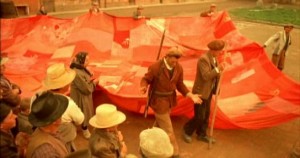 In the second half, the film picks up quite a bit. This is due mostly to a completely maniacal Donald Sutherland as the fascist Attila stealing his scenes. This could have been one of the most sinister villains ever seen; if Sutherland didn’t play him so over-the-top as if he were an actual super villain (cape sold separately). Regina, Atilla’s wife, is a very annoying character as well and is a drawback to the scenes that involve Attila. Her passive-aggressive behavior dampens his sinister traits. Perhaps this was intentionally done though to provide some extremely dark levity for the second chapter. Alfredo and Olmo are now in their thirties-forties and portrayed by Robert DeNiro and Gérard Depardieu. The acting level here improves drastically, but is still hammered down by scenes that are ridiculously drawn out and poorly paced. The scenes with the hooker, for example, are overlong and add little. The lack of a real human antagonist (aside from Attila) also makes the film suffer. Seeing as how the film is primarily about the class system and the friendship of the two, perhaps it was felt one wasn’t needed. The fact remains however that Atilla isn’t always there to stir up trouble, or even to have his presence felt. Since we are already being treated to the kitchen sink treatment, why not actually add a character that actually serves a purpose or is more memorable?
In the second half, the film picks up quite a bit. This is due mostly to a completely maniacal Donald Sutherland as the fascist Attila stealing his scenes. This could have been one of the most sinister villains ever seen; if Sutherland didn’t play him so over-the-top as if he were an actual super villain (cape sold separately). Regina, Atilla’s wife, is a very annoying character as well and is a drawback to the scenes that involve Attila. Her passive-aggressive behavior dampens his sinister traits. Perhaps this was intentionally done though to provide some extremely dark levity for the second chapter. Alfredo and Olmo are now in their thirties-forties and portrayed by Robert DeNiro and Gérard Depardieu. The acting level here improves drastically, but is still hammered down by scenes that are ridiculously drawn out and poorly paced. The scenes with the hooker, for example, are overlong and add little. The lack of a real human antagonist (aside from Attila) also makes the film suffer. Seeing as how the film is primarily about the class system and the friendship of the two, perhaps it was felt one wasn’t needed. The fact remains however that Atilla isn’t always there to stir up trouble, or even to have his presence felt. Since we are already being treated to the kitchen sink treatment, why not actually add a character that actually serves a purpose or is more memorable?
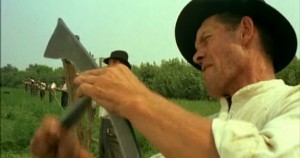 The closing segment which refers back to the all too brief prologue is an interesting piece of work. What I don’t understand is why it is used in such a manner? Perhaps this tactic was not used as often in the 70’s as it is now. Regardless, it seemed silly for a film like this. Particularly when, at such length, the prologue is nearly forgotten before it is returned to. The only discernable reason I can figure was to give a false sense of character for Attila and Regina. It isn’t explained why they would be hunted as they are. Perhaps we are supposed to feel sorry for these characters before hating them later. But it is all cinematography and no characterization. Impossible to feel for these characters one way or another. Often times, there seems to be a resort to pure and simple shock value, and trying to masquerade it as art. There is a very foul scene involving feces in the second half that could have been shortened. There is an important human message being made in there, but it is lost among characters that act subhuman. Therein lies another problem; I often found myself sympathizing more with the masters then the laborers, because they seemed to act like humans more often. Perhaps this was part of the point of the film, but what is the point of the laborer that slices off his ear off? Additionally there is also poor treatment to animals such as the pointless murder of a cat. Perhaps coming off his financial success of Last Tango in Paris, Bertolucci felt that his audience reacts primarily to the extremes and felt obligated to include it in 1900 as well. He did capture the look of Italy well enough. There are scenes that are completely stunning. The closing scene where Alfredo gets interrogated has some great overhead shots. Almost every scene from a moving vehicle, particularly the trains, makes the viewer feel as if we are truly looking out over the shoulder of another passenger.
The closing segment which refers back to the all too brief prologue is an interesting piece of work. What I don’t understand is why it is used in such a manner? Perhaps this tactic was not used as often in the 70’s as it is now. Regardless, it seemed silly for a film like this. Particularly when, at such length, the prologue is nearly forgotten before it is returned to. The only discernable reason I can figure was to give a false sense of character for Attila and Regina. It isn’t explained why they would be hunted as they are. Perhaps we are supposed to feel sorry for these characters before hating them later. But it is all cinematography and no characterization. Impossible to feel for these characters one way or another. Often times, there seems to be a resort to pure and simple shock value, and trying to masquerade it as art. There is a very foul scene involving feces in the second half that could have been shortened. There is an important human message being made in there, but it is lost among characters that act subhuman. Therein lies another problem; I often found myself sympathizing more with the masters then the laborers, because they seemed to act like humans more often. Perhaps this was part of the point of the film, but what is the point of the laborer that slices off his ear off? Additionally there is also poor treatment to animals such as the pointless murder of a cat. Perhaps coming off his financial success of Last Tango in Paris, Bertolucci felt that his audience reacts primarily to the extremes and felt obligated to include it in 1900 as well. He did capture the look of Italy well enough. There are scenes that are completely stunning. The closing scene where Alfredo gets interrogated has some great overhead shots. Almost every scene from a moving vehicle, particularly the trains, makes the viewer feel as if we are truly looking out over the shoulder of another passenger.
So the movie does have its merits, but it has no more then the average period film. This makes it a very hard film to recommend, but just as hard to discourage someone from seeing it. But in its complete version, I find it difficult to understand how the director could endorse it for there are many flaws. It’s really a shame that a good cut was never made. It’s possible that it could have been screened more, and made a significantly larger gross. Or, it could at least be remembered as something more than a black sheep on Bertolucci’s resume.
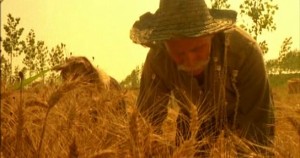 Analysis by a Lawyer: Richard Stracke
Analysis by a Lawyer: Richard Stracke
Bernardo Bertolucci’s 1900 has all of the makings of a great epic- capable leads, a wunderkind director, the opportunity to explore universal themes. It is, no doubt, an ambitious film, but one that collapses under its own weight. At five hours in length, it would be easy to complain about the film’s bloated running time. That argument would not address the film’s primary fallacy: its complete lack of subtlety. Bertolucci wants us to know that the idle rich are bad. They may very well be, but he pushes things to laughable extremes. He also makes a grave miscalculation. He seemed to assume that if one half of the cast was repulsive, the audience would automatically sympathize with their victims. In fact, in most situations, the proto-socialist peasant class was equally miserable to watch. I’ll admit that winning my sympathies would be nigh impossible, but I found myself in an awkward position. I hated the group that I should have loved and was rarely interested in the group that I wanted to root for.
I had high hopes for Burt Lancaster’s role. Unfortunately, it was little more than repeat of The Leopard minus all subtlety. The themes are covered. He feels that he has lived too long. He’s tired, out of touch with society, unable to change. If I wasn’t familiar with the earlier film, I probably would have liked it, but it in comparison, it serves as a demonstration how much better the film could have been had Bertolucci shown some restraint. The most obnoxious scene involves Lancaster’s attempts to get a young girl to masturbate him in while she milks a cow. He’s old and impotent, so she reminds him that “You can’t milk a bull.” He quickly sends her back to the dance and instructs her to tell everyone that he is no longer with them. I don’t see how throwing in a shot or two of child abuse help the scene. Wasn’t cutting back and forth between staggering Lancaster and cow’s udder enough to tell us that he was on his last leg? Does Bertolucci think that I’ll hate him and his class because of the added material? If he does, he’s wrong. It’s so unbelievable and as far as I can tell, out of character, that it becomes laughable. Rather than turning me against Lancaster, I pity him- Isn’t it a shame that someone thought it was a good idea for the character to do THAT?
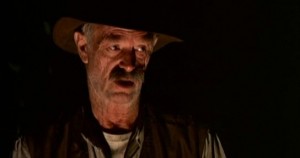 The rest of the early, childhood scenes drag on and on. Neither child has an especially powerful screen presence. I longed for DeNiro and Depardieu to take their places. I did like moments like the frog capturing scene. It established the differences between the boys/classes energetically. It’s too bad that the opening went on for another forty minutes. By that time, the boys had long since worn out their welcomes and the themes (including a few more scenes of impotence) had been beaten into the ground. I’m no sure why anyone would choose to identify with young Depardieu. He was an obnoxious brat. DeNiro may have been spoiled and rather wimpy, but if I were stuck with either of them, he would be infinitely preferable. It was as if we were supposed to like Depardieu simply because he was underprivileged and willing to dirty his hands/rebel. No. That doesn’t work for me.
The rest of the early, childhood scenes drag on and on. Neither child has an especially powerful screen presence. I longed for DeNiro and Depardieu to take their places. I did like moments like the frog capturing scene. It established the differences between the boys/classes energetically. It’s too bad that the opening went on for another forty minutes. By that time, the boys had long since worn out their welcomes and the themes (including a few more scenes of impotence) had been beaten into the ground. I’m no sure why anyone would choose to identify with young Depardieu. He was an obnoxious brat. DeNiro may have been spoiled and rather wimpy, but if I were stuck with either of them, he would be infinitely preferable. It was as if we were supposed to like Depardieu simply because he was underprivileged and willing to dirty his hands/rebel. No. That doesn’t work for me.
Before continuing with complaints, I’ll discuss the scenes that I enjoyed. Most take place early in the character’s adult lives and involve DeNiro’s mistress/wife. She becomes less than interesting when her eyes are opened to suffering of the masses and she, like everyone else with a few lira in their pocket are unable to act rationally, turns to the bottle. Fortunately, when she was lively and shallow, she was the most likable character in the film. Now, I’m almost certain that I shouldn’t feel this way. After all, she’s “blind” to the real world, self centered, aloof, lacking in any form of self control and she takes great joy in mocking the poor. After what seemed like hours of babbling about “masters” and the class struggle (“I waited my whole life to see masters work”), it was refreshing to see someone who cared as little for the peasants as I did.
Not only did I like her character, but her scenes involved the film’s best element- the use of music and rhythm. The film is filled with dances, references to opera and clever use of sound. It gave me something to focus on when I was disinterested in what I was seeing. It is the film’s most successful aspect because it gives the audience the impression of grandeur without the overbearing themes that are ever present in the narrative. Given the Verdi reference and the film’s vast scope, Bertolucci seems to have aimed for operatic heights. Despite the film’s other missteps, he is successful in musical terms.
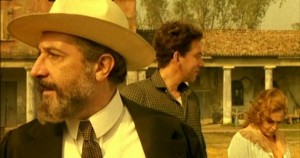 Getting back to discussion of the key players, Donald Sutherland begs to be analyzed. Although his role is not perfect, I’m tempted to consider it the film’s strongest. There’s the scene with the cat. I hated him for it. I was numb. The cat looked just like mine. It was made even worse because he prefaced everything by commenting on the way that the poor kitty played on audience sympathies. I knew something dreadful would happen, but I wasn’t prepared for it. As traumatic as the scene was, it was incredibly effective. I was like clay in the director’s hands. He struck a single (off screen) blow and I felt it for my entire 24 hour ent arce . He should have used the same strategy for the murder of the young child. Instead, he dragged it out and made it ridiculous. I can’t imagine a soul outside of a horror movie who would run around a room swinging a child by his feet. By the end, I wasn’t numb. I was laughing. The scene was ruined because it went far over the top. We already know that Sutherland is wicked. Minimal carnage would have been more than enough to reinforce the point. The same goes for the peasant’s revenge scene. Yes, he was covered in manure, but did we need to see it for 2 or 3 minutes? I didn’t feel their satisfaction. It wasn’t jubilant. I got the point after ten seconds. Move on.
Getting back to discussion of the key players, Donald Sutherland begs to be analyzed. Although his role is not perfect, I’m tempted to consider it the film’s strongest. There’s the scene with the cat. I hated him for it. I was numb. The cat looked just like mine. It was made even worse because he prefaced everything by commenting on the way that the poor kitty played on audience sympathies. I knew something dreadful would happen, but I wasn’t prepared for it. As traumatic as the scene was, it was incredibly effective. I was like clay in the director’s hands. He struck a single (off screen) blow and I felt it for my entire 24 hour ent arce . He should have used the same strategy for the murder of the young child. Instead, he dragged it out and made it ridiculous. I can’t imagine a soul outside of a horror movie who would run around a room swinging a child by his feet. By the end, I wasn’t numb. I was laughing. The scene was ruined because it went far over the top. We already know that Sutherland is wicked. Minimal carnage would have been more than enough to reinforce the point. The same goes for the peasant’s revenge scene. Yes, he was covered in manure, but did we need to see it for 2 or 3 minutes? I didn’t feel their satisfaction. It wasn’t jubilant. I got the point after ten seconds. Move on.
Finally, I take issue with the film’s finale. Bertolucci wants me to believe that DeNiro’s passivity (either due to apathy or cowardice) is the sole cause for the peasants’ misery. He uses spends a good forty-five minutes with proletariat ramblings. Other than Depardieu none had any redeeming qualities. Why should I care? Is it because they’re dirty and oppressed? No. That doesn’t sway me. Is DeNiro really to blame for all of Sutherland’s crimes? He rejected those views in an earlier church scene. That’s enough for me. I take issue with requiring anyone with money to risk everything and martyr themselves for causes that have no direct relation to their lives. Apathy and detachment may not be virtues to strive for, but they aren’t crimes. To waste forty-five minutes of my time with flag waiving and empty speeches is unforgivable. It was meant to be the film’s capstone statement, but as before, it was taken to such extremes that I became completely unreceptive and seethingly bitter. Those emotions tainted the film as a whole.
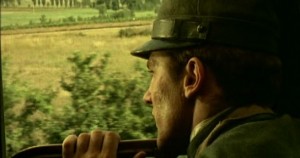 Analysis by an elitist: Adam Lippe
Analysis by an elitist: Adam Lippe
What makes an epic an effective film is an equal focus on the small moments and the large. David Lean understood this with Lawrence of Arabia, ensuring that while the canvas got plenty of attention, there was also a focus on character, and spectacle wasn’t the only thing on display. Bernardo Bertolucci’s 1900 is all broad strokes and no specifics. Ideas are approached, but not discussed. The dialogue is all rhetoric, not conversation. Nearly every shot is stunning, worthy of a painting, but that’s all it is. He never gets close enough to the characters to examine them.
The proof is in how much explaining the actors have to do, constantly describing what happened to their loved ones, detailing their lives instead of living them. It turns the plot into a series of events, not a story with progression. It’s why we only see the big scenes of emotion, filled to the brim with Morricone music, peasants fighting the system, deaths, marriages, horrific acts of violence and rape, but no buildup. Bertolucci only presents the end of the drama, not the more important lead-up to it. He sketches the images and the penultimate moment where everything comes together for something visually striking, but not a reason why we should care. When there is a fire that distracts the peasants from their dance in the barn (and allows De Niro to rape/seduce, his soon to be wife, Ada), Depardieu helps carry the dead bodies the next day through the main square, yelling out that these people were killed by the fascists, because they worked their whole lives. The charred bodies being carted around, as those marching yell at closed windows and doors, is a great idea and a powerful image, but we don’t know any of these people who died, or what they felt about politics at all, so it’s just an amazing bit of camerawork and nothing more, nary a feeling to be had about the scene.
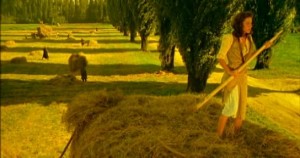 It seems odd that Bertolucci would leave out anything in a 5 hour film, but so many characters get lost in their struggles that it becomes difficult to remember who is who, and why they are angry or upset at someone else. It’s as if there’s a more subtle movie going on just in the other room, where people figure out their motivations, but Bertolucci can’t fit his camera through the door to show it to us. Dominique Sanda, who played Ada, goes from obnoxious and insufferable, finding herself too good for everyone else and pretending to be blind, to miserable and a drunk without us ever understanding why. When she disappears near the end of the film, we don’t really feel anything because we don’t know why she’s so upset. De Niro discovers this but it’s difficult to fathom what exactly he misses in her. For that matter, the two main characters, played by De Niro and Depardieu never come into focus at all. One never has much idea what drives them, they often appear on the periphery of their respective causes or why they act the way they do. It’s odd that two actors with such presence have been given essentially nothing but outlines to work with and come across as ciphers. When De Niro walks out of the church donation scene as Atilla tries to organize the masters against the striking peasants, we don’t know why he feels one way about the situation, or how he’s even changed years later as the master himself. In fact, when Ada chides him about how he’s changed as a person, one wonders how someone who makes no impression could change. Only Donald Sutherland, grinning so wide in every shot, he looks like Jack Nicholson’s Joker, makes an impact. This is one of Bertolucci’s largest mistakes, he makes the character who is supposed to embody all the evils of fascism, a pedophile, murderer, etc., the most memorable, and stick out far more than his application of his politics. Attila’s various atrocities are moments of pure shock value, effective but empty. When he and his wife kill the Pioppi widow after she traps them in her/their house, it’s a little difficult to remember how Sutherland relates to her past at all and why she takes revenge.
It seems odd that Bertolucci would leave out anything in a 5 hour film, but so many characters get lost in their struggles that it becomes difficult to remember who is who, and why they are angry or upset at someone else. It’s as if there’s a more subtle movie going on just in the other room, where people figure out their motivations, but Bertolucci can’t fit his camera through the door to show it to us. Dominique Sanda, who played Ada, goes from obnoxious and insufferable, finding herself too good for everyone else and pretending to be blind, to miserable and a drunk without us ever understanding why. When she disappears near the end of the film, we don’t really feel anything because we don’t know why she’s so upset. De Niro discovers this but it’s difficult to fathom what exactly he misses in her. For that matter, the two main characters, played by De Niro and Depardieu never come into focus at all. One never has much idea what drives them, they often appear on the periphery of their respective causes or why they act the way they do. It’s odd that two actors with such presence have been given essentially nothing but outlines to work with and come across as ciphers. When De Niro walks out of the church donation scene as Atilla tries to organize the masters against the striking peasants, we don’t know why he feels one way about the situation, or how he’s even changed years later as the master himself. In fact, when Ada chides him about how he’s changed as a person, one wonders how someone who makes no impression could change. Only Donald Sutherland, grinning so wide in every shot, he looks like Jack Nicholson’s Joker, makes an impact. This is one of Bertolucci’s largest mistakes, he makes the character who is supposed to embody all the evils of fascism, a pedophile, murderer, etc., the most memorable, and stick out far more than his application of his politics. Attila’s various atrocities are moments of pure shock value, effective but empty. When he and his wife kill the Pioppi widow after she traps them in her/their house, it’s a little difficult to remember how Sutherland relates to her past at all and why she takes revenge.
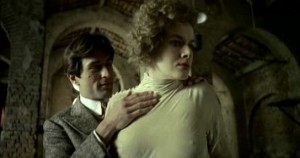 In fact, a lot of this material could have been cut. The head butt death of the cat and the simultaneous rape/bludgeoning of the child prove Atilla’s gleeful ruthlessness enough, including a convoluted mortgage scam is overkill and only complicates matters. It’s not even that the movie needs to be shorter, it just needed more focus. The peasants are constantly singing about their problems (there really didn’t need to be this much singing), but their lifestyle nor dialogue reflects anything overtly Communist, and only Depardieu, during the conclusion, with his embarrassing direct to camera preaching address (which, ironically, by its proximity, only further distances the viewer), reveals any passionate credo that doesn’t sound like something repeated from memory. From what we see, they never even considered any Communist ideals at all. We are also never shown how De Niro takes advantage of his position as a master, or how Atilla believes in Fascism as anything other than an excuse to be sadistic. A big mistake made, is that while we get the impression Sutherland is a glorified bodyguard who also deals with the peasants, there is much talk about how he is constantly turning in Communists to the police, including his own workers, but we never see him doing this, or what benefit he would get out of making his job harder.
In fact, a lot of this material could have been cut. The head butt death of the cat and the simultaneous rape/bludgeoning of the child prove Atilla’s gleeful ruthlessness enough, including a convoluted mortgage scam is overkill and only complicates matters. It’s not even that the movie needs to be shorter, it just needed more focus. The peasants are constantly singing about their problems (there really didn’t need to be this much singing), but their lifestyle nor dialogue reflects anything overtly Communist, and only Depardieu, during the conclusion, with his embarrassing direct to camera preaching address (which, ironically, by its proximity, only further distances the viewer), reveals any passionate credo that doesn’t sound like something repeated from memory. From what we see, they never even considered any Communist ideals at all. We are also never shown how De Niro takes advantage of his position as a master, or how Atilla believes in Fascism as anything other than an excuse to be sadistic. A big mistake made, is that while we get the impression Sutherland is a glorified bodyguard who also deals with the peasants, there is much talk about how he is constantly turning in Communists to the police, including his own workers, but we never see him doing this, or what benefit he would get out of making his job harder.
There are a number of things that seem to be bereft of this clarity, which results in the choppy feel of the film. This probably has to do with Bertolucci’s immersion in his own message, his passion and didacticism for expressing his views on Communism, personified by the Depardieu monologue, which obscures a feel for the people in the film. He forgets that if we want to understand ideals or a way of living, then we need to be lead by example, not polemic.
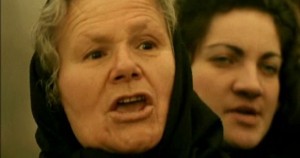 The Chat:
The Chat:
Adam: Per the scene where Ada kisses the maid and it’s off-screen, why is shit flinging and child murdering ok to see, but lesbianism not? This is seeing as the women are hidden behind the suitcase as they lean in. It’s not that I needed some overt dyke-action, but subtle, the movie is not.
Rhett Maybe because it is probably one of the nicest moments of the film, Bertolucci wanted to avoid sentimentality?
Richard Don’t forget the tag team masturbation scenes.
Shawn Yes, but the first half is loaded with sentimentality.
Adam That’s my biggest issue actually, it’s all sentimentality. There’s no lead up to the sentiments though. It’s just the high points. It’s as if he felt like cutting a reel for Storaro, of all the high points he could muster.
Rhett The masturbation scenes are empty though, as are most relationships in the film that one seemed to be the only one that was genuine.
Richard Do you think it was out of respect for the characters? He seemed to want to make the men look like swine. Maybe he wanted to elevate the women.
Rhett Yeah, I think so Richard. We never see any of the relationships with the men, Olmo just seems to have a new woman with every scene, and De Niro and Ada may as well not be married for how much time they spend together.
Richard As far as the high points go, he seemed to take things too far on almost every occasion. There was no subtlety, so what could have been shocking/disturbing frequently became laughable.
Rhett Sutherland and his woman seem aligned more for political reasons more than anything.
Adam But what allegiance did Sutherland have to the party? His ideals were more centered around debasement. I’m not sure how he related to fascism at all.
Shawn Fascist by fashion. He liked the leather and the machismo.
Adam No one seemed to live their lifestyles according to their parties. since we never see outside the land, we don’t know how others handle their politics, what role the church would have. Which was odd, because you figure neither communists nor fascists would have a need for religion
Richard Not only his relationship to the party, but his ties to De Niro. The peasants seemed to blame their ‘master’ for everything that Sutherland did, but he seemed more of a loose cannon. Uncontrolled by anyone, let alone De Niro.
 Rhett Yeah Richard, and it is kind of puzzling how little you see of De Niro running the farm since he is supposed to represent fascism to the degree that Olmo does communism.
Rhett Yeah Richard, and it is kind of puzzling how little you see of De Niro running the farm since he is supposed to represent fascism to the degree that Olmo does communism.
Adam Seeing as how it is presented in the conclusion, that he has run their lives into the ground, he’s the [cue Pacino] absentee landlord!
Richard I think they were trying to show how passive/impotent he was, but given how disconnected he was, I found it hard to blame him for much. Apathy isn’t a crime.
Shawn So he ran them into the ground by inactivity?
Adam Richard, wouldn’t the peasants be apathetic as well? When did we ever learn about how they felt about the world? Apart from their singing.
Rhett I found it incredibly odd that at the end, when De Niro’s character is put on trial, I basically knew NOTHING as to what kind of a master he was. So the message was lost to me.
Richard I know we were supposed to blame him for running their lives into the ground, but I didn’t like how all of the blame fell on him- without adequate facts to back it up.
Shawn I found it incredibly difficult to sympathize with the laborers.
Adam How so, Shawn?
Richard I agree with Rhett and Shawn on the message/sympathy issues.
Adam Dammit, I need someone to agree with me, or I’ll start pouting.
Shawn Because the laborers inflicted problems against themselves. Shown where one slices his own ear off. What was the bloody point in that? So he can later complain about poor treatment? No one asked him to do something so stupid.
Richard The laborers were filthy and despicable. They did nothing to help themselves, but we were supposed to buy the bourgeois oppression.
Rhett We learn so little about any of the characters’ personalities. The whole movie seems to just be about metaphors and broad characterizations.
Adam I thought it was odd that we never learned who the kid was. The one who got raped and killed. Who’s child was he?
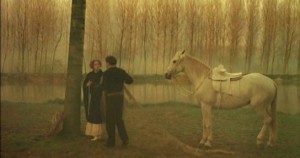 Rhett Wasn’t it De Niro’s nephew?
Rhett Wasn’t it De Niro’s nephew?
Shawn That is trivial. I think it was the point of a child being killed on a wedding day.
Richard I was confused as well. It seemed like another time where we were supposed to cry just because he was a child.
Adam The family connections were so hard to follow, I was often lost.
Rhett I thought though, for the most part the film stayed pretty focused on the main characters. Considering its length, it remains pretty tight.
Adam Really, Rhett? Focused? Jumping from event to event in such a scattered fashion isn’t focused.
Rhett Not that you really get to know any of the characters. Just in terms of how many people the film follows. Not structure.
Adam But if you don’t know anything about the characters and it’s just a poorly written lecture on the benefits of communism and the evils of fascism, how is that focused?
Richard The child murder scene was so over the top. I couldn’t help but laugh. I wish that he would have cut away earlier. It could have been upsetting- like the cat scene was for me.
Rhett Yeah, I felt nothing during that child murder scene
Shawn I laughed there too. I think that the cat and the child were similar though.
Rhett It seemed like Bertolucci was really hammering it home that Sutherland’s character was sadistic. I think he made his point with the cat murder, or even raping the kid earlier.
Adam The cat part was supposed to have humor in it though. Hence the blood on his face that remains as he keeps talking.
Shawn And that it was Regina’s cat made it even more funny.
Adam Well that dulled the later murder. They kill that same woman’s cat and she brings it to the priest. And then they kill her when she tries to take her revenge. But it wasn’t as repulsive as the other scenes
Rhett I never felt lost like I would in a Fellini film, it was focused in that Bertolucci stuck with a small set of characters throughout the expansive running time.
Shawn What was the point of the prologue? Is it to force sympathy towards Attlia/Regina/Alonzo? Before knowing them.
Rhett As was Sutherland’s comparison between cats and communists, since the film really goes into great detail in using animal imagery for metaphor.
Richard I didn’t find the cat part funny… mainly because it looked just like my kitty. I found it far more effective than the child murder because it didn’t drag on an on. Plus, it didn’t actually show the strike. Only the blood remained.
Adam Well you can’t really headbutt a cat to death in that fashion.
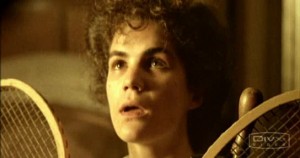 Richard As far as the prologue goes…. I thought it was an attempt to hint at the ultimate collapse.
Richard As far as the prologue goes…. I thought it was an attempt to hint at the ultimate collapse.
Rhett And plus, Richard, at that point we aren’t aware of how sadistic Sutherland’s character is, which makes it all the more shocking.
Adam But does Bertolucci undermine himself with the goofy ending? With the old age makeup and the faux beating each other up.
Rhett I actually loved the ending… thought it was the best part of the film. It is basically Bertolucci stating that these political struggles are irrelevant…people never change. And more so, people are all the same. Since, even after all they’ve been through, they ultimately end up seeking the same things they did when they were children. Listening to power lines and lying on train tracks.
Richard I thought it was laughable.
Shawn I thought it was a funny way of saying “nothing personal.” I think that it works as an ode to their friendship. It is a bit overdone, but so is the entire film.
Adam It takes the edge off completely. Any message he was trying to pass off in the Depardieu monologue, which is the low point of the film, is lost by silliness like old men pretending to beat each other up.
Richard But couldn’t it have been handled in a way that was somewhat consistent with the tone of the previous 5 hours?
Rhett I thought the final part with De Niro on the tracks was consistent with the tone of the rest of the film.
Adam The tracks part is fine; it was in line with the great time passage on the train.
Richard I meant the wrestling/fighting.
Rhett It is a bit of a tone shift, for sure.
Richard It was also abrupt. As tired as I was by that point, it could have used an extra minute or two to ease the transition.
Adam But the wrestling/fighting and the way the peasants just give up, after 20 minutes of power, that seems to deflate the movement of the drama.
Rhett I just admired Bertolucci’s guts to pull out a 180 after what would seem to be 4 hours leading to a formulaic finish… I liked it…no matter how much we change we ultimately still remain the same.
Shawn I liked how that even though they have different backgrounds and different social values, they can still be friends.
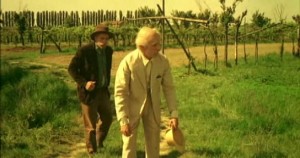 Shawn Has anyone seen any of the other cuts?
Shawn Has anyone seen any of the other cuts?
Adam Parts of the 4 hour version on cable. I’ve also seen the making of
on 16mm at the library.
Shawn Did it seem to flow any better?
Adam No, it’s just as choppy, if not more so.
Rhett The movie could have easily run a couple more hours to fill in many of the gaps.
Adam I’d bet they cut a lot of the more explicit stuff for an R rating to get into the shorter version.
Rhett I was kind of struck by how Bertolucci handled some of the provocative sexual content.
Shawn Child porn, even related to Socialism, isn’t popular in the theatres.
Richard Speaking of the explicit stuff- Why was the scene when Lancaster tried to get the girl to ‘milk’ him necessary?
Adam To show that Viagra was not invented yet.
Shawn You can’t milk a bull, Richard.
Rhett There seemed to be nothing objectionable to seeing two kids play with themselves, or the old man kindly asking the girl to reach into his pants. They both just seemed so innocent. Like Lancaster didn’t mean for anything malicious, just kind of playfully accepting his impotency.
Richard Was it supposed to be an innocent almost Alzheimer’s moment of confusion?
Shawn I worked in a hospital, and I don’t know any Alzheimer’s patients that have confused themselves with a cow and asked to be milked… Do you think if she would have rubbed one out for him, he wouldn’t have hung himself?
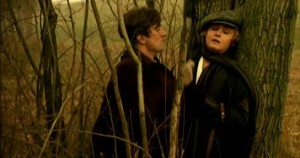 Adam I understand that when the body dies, there is a “release.”
Adam I understand that when the body dies, there is a “release.”
Rhett His impotency being, I think, a metaphor for how the power of the master is weakening in lieu of the communist revolution.
Adam Perhaps that would have saved him. He was just all built up… I think what would have really improved the film, was if there were at least 6 more scenes of the peasants singing. I especially enjoyed Depardieu’s off-key rendition when the horse’s were pulling ahead of him
Rhett Ah come on, those scenes were nice. Gave them unity, it reminded me a lot of the chanting of the Algerians in The Battle of Algiers.
Richard I happened to like the musical scenes. It added an operatic undertone to the film. Which goes along with them being born on the date of Verdi’s death.
Shawn We are the women! We love are children! We let our masters rape them! And we don’t give a damn!
Adam “I’ll go to Rome and protest in my underpants.”
Rhett “I’m fucking the ground.”
Shawn Turn on your webcam! Wooooooo!
Rhett I wonder if this film garnered much protest? It seems to have flown under the radar much more than something like Cannibal Holocaust. Although there is just as much animal cruelty in 1900. With the pig, the frogs, etc.
Shawn Forcing horses to shit.
Adam Imagine being that actor who had to put his hands out, take after take.
Richard Did anyone else think that the sections with the boys went on for far too long? I couldn’t wait to see De Niro and Gerard.
Adam Richard, that doesn’t really differ from Once Upon a Time In America.
Rhett I thought those scenes were good, Richard, since they had way more character development than any of De Niro’s or Depardieu’s scenes… I think there are a lot of similarities between America and 1900. They both kind of end on a nostalgic note, De Niro trying to recall a happy moment of his childhood.
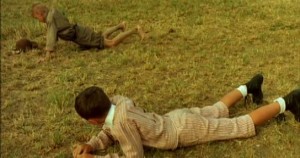 Adam They both have similar problems of not getting a full sense of a world, being a bit too general and too specific at the same time.
Adam They both have similar problems of not getting a full sense of a world, being a bit too general and too specific at the same time.
Richard I didn’t ‘hate’ the scenes. In fact, I really liked the frog bit, but I was glad when they grew up.
Rhett I thought the whole thing was gorgeous, especially the sun-soaked first half.
Richard I agree Rhett. It reminded me of the recent “I’m Not Scared.”
Adam There are so many shots that are amazing to look at. Like paintings. But that further emphasized the distance. A concentration on the still shot, rather than the whole picture.
Rhett It’s true. It made it hard to care about the characters. They seemed kind of like set pieces.
Shawn I enjoyed the second half just because my demented mind was happy to finally have a discernible villain.
Rhett Sutherland gnarls his teeth like no other.
Richard I felt detached too, but do you think that was the intention? He seemed to really push the communist angle. I felt like he wanted me to care about the workers. I just didn’t.
Shawn I think he was more or less just tying to capture time and place. Show you Italy from 1900-1950 or so or politics in general in those times.
Rhett Maybe instead of wanting us to care for any specific character he first just wanted us to consider the aspects of communism and fascism. Even though I never really felt for any of the characters, I thought the whole film was really easy to watch. Much more accessible than I had imagined.
Richard So, it may have been all allegorical? That would explain the lack of character detail and the generalizations.
Adam The disconnections made it drag for me. I had a hard time remembering who was related to whom.
Richard It did move far faster than I expected. I only really felt it in the final 40 minutes or so. That’s mainly because I wasn’t receptive to the speeches and stuff.
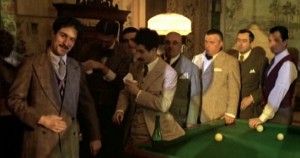 Adam One of my favorite reviews of all time is for 1900. It’s Pauline Kael’s, called “Hail Folly.” She goes in a lot of detail about how the movie is emblematic of directors who go off the deep end. Trying to sum up the world in their movie. Trying to appeal to everyone with a personal, yet very universal message.
Adam One of my favorite reviews of all time is for 1900. It’s Pauline Kael’s, called “Hail Folly.” She goes in a lot of detail about how the movie is emblematic of directors who go off the deep end. Trying to sum up the world in their movie. Trying to appeal to everyone with a personal, yet very universal message.
Shawn Did you find this movie personal or universal? I don’t think I would use any “lessons” here in my personal life.
Adam I think it is lost in the abyss of neither.
Rhett I would never headbutt a cat.
Adam Moments are clearly about Bertolucci’s political feelings, but the characters, with which he should have used to make his points, are nothing. And he focuses on the deaths, marriages, and calamities in people’s lives, but those people have no dimensions. They are pawns in his polemic.
Rhett Here is an excerpt from Kael’s review: “Bernardo Bertolucci’s utopian folly is about two boys born in the North Italian region of Emilia-Romagna on the same day in 1901. Alfredo (Robert De Niro) is the heir to the vast landholdings of his grandfather (Burt Lancaster), and Olmo (Gérard Depardieu) is the bastard grandson of the patriarch (Sterling Hayden) of the peasant clan that lives on those holdings and labors for a share of the crop. Bertolucci is trying to transcend the audience appeal of his lyrical, psychological films. He is trying to make a people’s film by drawing on the mythology of movies, as if it were a collective memory. 1900 is a romantic moviegoer’s vision of the class struggle-a love poem for the movies as well as for the life of those who live communally on the land. (The belief that permeates the movie is that Communism will preserve the folk culture of the peasants.) In form, it’s an opera-novel, and its homage is to Verdi, the great Emilian who died on the day of the two boys’ birth; It has all of Bertolucci’s themes and motifs, and one could call it the Portable Bertolucci, though it isn’t portable. It’s like a course to be enrolled in, with a guaranteed horror every hour; there are also sequences as great as any ever filmed.
Adam It seems she was correct. Bertolucci was trying to do too much, and ended up just trying to string it all together. Shawn had told me that the second part could be watched on another day with no lag. As if it was a different movie. And I agree it lags much worse. The photography is no longer a focus by that point, but it’s mostly just random atrocities instead.
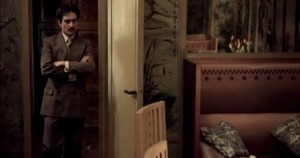 Shawn The colour seems to be more muted in the 2nd half as well. But that seems to be the point. The first half is a lot more innocent.
Shawn The colour seems to be more muted in the 2nd half as well. But that seems to be the point. The first half is a lot more innocent.
Rhett Yeah, I think that has to do with how the childhood ideals had been corrupted with politics, Shawn.
Shawn Obviously Rhett, if you think about Socialism when you masturbate, you are going to grow up to be a boring fuck.
Rhett “It’s like a worm.” I think Ennio Morricone has composed every substantial film in italy from 1965 onward.
Shawn What about Goblin?
Rhett Goblin panders more to the horror geek.
Shawn Suspiria has Udo Kier, and has just as little development as 1900. That makes it better.
Adam The first portions of the score, it is working too hard. Much like Morricone did for Cinema Paradisio. Trying to create transcendent emotional moments via the music, instead of the filmmaking. Cinema Paradisio always made me embarrassed for Morricone, and this had an inkling of it, where the music is just a little too big for what’s onscreen.
Rhett I thought it was pretty subtle. Not nearly as sweeping as I would expect an epic score to be.
Adam It was not overwhelming, and it got better as it went along, anything to distract from that hideous fake snow. That looked like detergent on the cars
Rhett Does Bertolucci start off most of his films with a shot of a painting? I know he does in Last Tango, but what of the others?
Richard I can’t remember any. I can take a look at the start of The Conformist for you.
Shawn I don’t remember a painting in The Dreamers.
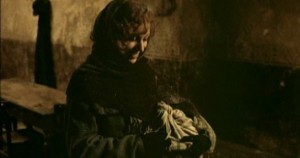 Rhett The paintings at the start of last tango seemed to be so important.
Rhett The paintings at the start of last tango seemed to be so important.
Shawn Perhaps he was in a “painting” period of his life when he made those films.
Rhett I figured it was something that would extend to many of Bertolucci’s films.
Richard I just checked. No painting. It is one of the characters on a train. Lots of neon and reddish lights.
Adam How come Sutherland wasn’t cast as the Joker in Batman?
Shawn Because he was destined to be Merrick in Buffy. Which is also better then 1900, but he doesn’t kill a kid in it.



